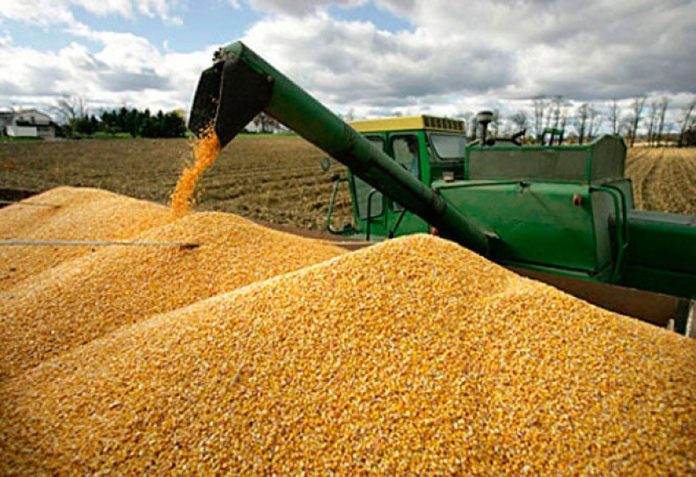Mexico is studying tariffs on United States corn and soybean imports worth US $4 billion annually in case the U.S. should escalate trade tensions by imposing additional tariffs of its own, officials told the news agency Reuters.
The federal government is currently studying how to reduce the pain of such a move, the officials said, although it is considered a last resort given that Mexico is the number-one export market for United States corn.
Tariffs on grains would come at a considerable cost for both U.S. exporters and buyers in the domestic market.
Mexico struck back swiftly after the United States announced May 31 that it would impose 25% and 10% tariffs on Mexican steel and aluminum imports by imposing its own “equivalent measures” on U.S. products including steel, pork, apples, bourbon and cheese.
But it didn’t include corn and soybeans, both of which are used in Mexico to feed cattle, hogs and poultry.
However, Mexico has already begun increasing its grain imports from producers such as Brazil and Argentina, meaning that the impact of any move to enforce tariffs on U.S. grains could be reduced.
National Agricultural Council (CNA) president Bosco de la Vega told Reuters that he attended a June 4 meeting at the Economy Secretariat where grain tariffs were discussed, but he explained that such a move was intentionally “left for a major crisis phase.”
Economy Secretary Ildefonso Guajardo — who is also Mexico’s chief negotiator in ongoing NAFTA talks — was present at the meeting, he said.
De la Vega explained that tariffs on grains would be targeted at the United States corn belt and specifically mentioned the states of Missouri, Kansas, Iowa and Nebraska, all of which were won by U.S. President Donald Trump in the 2016 election.
Many of the tariffs Mexico has already imposed were also aimed at products exported from states that are politically important to Trump, especially considering that midterm elections will be held in the United States in November.
Raúl Urteaga, director of international trade for the Secretariat of Agriculture (Sagarpa), said that “right now” Mexico is not targeting U.S. grains but he didn’t rule out the possibility it would at some time in the future.
One eventuality that would likely pressure Mexico to act is the introduction of tariffs that affect its US $67-billion auto industry.
The government is particularly concerned about the United States’ decision last month to launch an investigation into vehicle imports given that it could lead to that outcome. De la Vega said, “That’s why we’re preparing.”
An anonymous trade source told Reuters that the decision not to include grains in Mexico’s first round of retaliatory measures was made in order to retain options as trade negotiations continue and to avoid subjecting Mexican consumers to higher prices.
But although Mexico may feel that the option to impose grain tariffs is a trump card, playing it might not be the wisest move given that cheap U.S. grain imports have helped Mexico’s growing beef industry to become a major global exporter over the past 20 years.
If tariffs were imposed on corn and soy, finding enough alternative suppliers without incurring significantly higher costs would be difficult and some analysts don’t believe it could be done without seriously damaging Mexico’s meat producers.
Former Sagarpa undersecretary Mariano Ruiz Funes said “there’s no real possibility of substituting these two products in the short term” because “the impact on the pork and beef industries in Mexico in terms of costs would be brutal.”
However, de la Vega said the Economy Secretariat is considering introducing a broad duty-free quota that would attract larger grain imports from other suppliers and therefore offset the higher costs of U.S. grains.
The same measure was introduced for pork last week, while Guajardo said that Mexico would “surely” look to import more pork from Europe.
A tariff-free quota on grain would likely benefit Brazil and Argentina in the short term given that Mexico has already increased its imports from both countries as part of its strategy to reduce dependence on its northern neighbor.
During the first quarter of 2017, imports of Brazilian yellow corn and soybeans were non-existent but in the first quarter of this year Mexico bought 107,000 tonnes of the former and 74,000 tonnes of the latter at a combined cost of US $48.5 million, according to government data.
De la Vega said he expects Brazilian feed corn imports to reach one million tonnes by the end of the year while Argentine shipments of the same grain will likely reach 500,000 tonnes.
However, the volumes are still relatively low compared to the approximately 14 million tonnes of corn and almost four million tonnes of soy that Mexico imported from the United States last year.
“Any disruption to this critical trade through tariff or non-tariff barriers would be detrimental to U.S. farmers, Mexican livestock producers and ultimately consumers,” said Ryan LeGrand, head of the Mexico office of the U.S. Grains Council.
Source: Reuters (sp)
